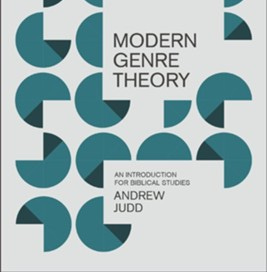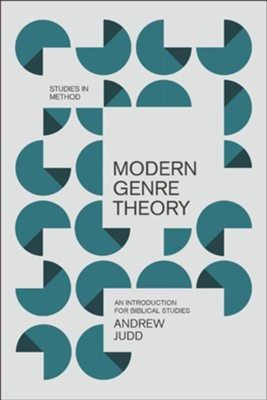Andrew Judd
Modern Genre Theory: An Introduction for Biblical Studies
Grand Rapids, MI: Zondervan, 2024.
I have some awesome colleagues at Ridley College. Among them are superb Bible scholars, theologians, pastors, preachers, youth ministry trainers, professional development facilitators, and more. And my colleagues can write some good books too.
One book I’m really excited about is Andy Judd’s new book on the Bible and genre theory.
Step one, forget everything you know about genre theory, because it is either wrong, or out of date by 50 years.
Step two, consider how the genre of movies can oscillate depending on the viewer. Is the movie Psycho a horror or psychological thriller? Is the movie Creature from the Black Lagoon, horror or sci-fi? Reviewers varied in how they judged the movies.
Step three, read an online debate among Swifties as to whether Taylor Swift’s music is country, pop, or country-pop? Who is right and who decides?
Genre is complicated and we are faced with questions of whether genre is about content, context, reception, or interpretation. Now let’s have this same debate with the Bible!!!
Judd points out that genre theory has experienced a renaissance in the last thirty years, but biblical studies have been left in the dark ages of rigid taxonomies and outdated theories.
Drawing on modern genre theory and socio-linguistics, Andrew Judd explains what genre is and how it matters for reading the Bible. Genre affects how you read everything from Genesis to Revelation (especially Genesis and Revelation I should add!).
For me, as a NT scholar, the most important chapter was the one on the genre of the Gospels.
Until recently, everything I learned about genre theory I got from Richard Burridge (still a good read!), only slightly updated with a few further readings about the Gospels as ancient biographies by people like Sean Adams and Helen Bond. Yet this book by Judd showed me that we need to move way beyond stale debates comparing the Gospels to Plutarch, Homer, Herodotus, and Haggadah if we want to grasp how the the Gospels are illuminated by modern genre theory.
Judd points out that the notion of the Gospels as a sui generis (new unique form) is not without merit, yet can be somewhat dissatisfying. Burridge’s attempt to render the Gospels as Greco-Roman bioi by family resemblance remains popular but has a lot of problems. Also, Judd notes that if genre is something of a social function, then putting the four Gospels into a biblical canon, impacts the way they are viewed and used, and thus shapes their genre!
What Judd concludes is that the Gospels don’t have a single genre, but they have different relationships to different types of “other” literature (biography, historical narrative, novel, etc.) and they constitute a new way of doing things with older literary types.
Judd also chimes in on the Francis Watson vs. Simon Gathercole debate as to whether the apocryphal/non-canonical Gospels are “gospels.” He points out that social functions is paramount so that the genre of the Gospel of John and Gospel of Thomas depends entirely on whether the contents about Jesus and its claims to apostolic authenticity are viewed as true and valid in a certain reading context. So, is the Gospel of Thomas a gospel, well, it depends who you ask and how the book is used!
Anyway, for anyone who teaches in or reads up on biblical interpretation, this is the # 1 book of the year for biblical studies and needs to be on your must-read list.
It is a game-changer!





"What Judd concludes is that the Gospels don’t have a single genre, but they have different relationships to different types of “other” literature (biography, historical narrative, novel, etc.) and they constitute a new way of doing things with older literary types."
Definitely going to add this book to my list (as if my list hasn't grown since subscribing to this Substack). I love this sentence and you literally put the words into my mouth.
1. The way I do hermeneutics is by viewing the Gospel in different genres and seeing what I get.
2. I do believe that we can apply this to the OT. I'll have to read the book but in my own studies I've found that books of the Bible often have relationships to other genres moreso than the static genre it is given.
Thanks for the tip. I just picked up Jesus Contradicted by Licona. Bonds work on Mark’s Gospel was eye-opening. Witherington’s Rhetorical approach (does Judd comment on that?).
If I understand what you’re saying, his approach is more dynamic taking into account not only the reader’s perspective, but also its canonicity?